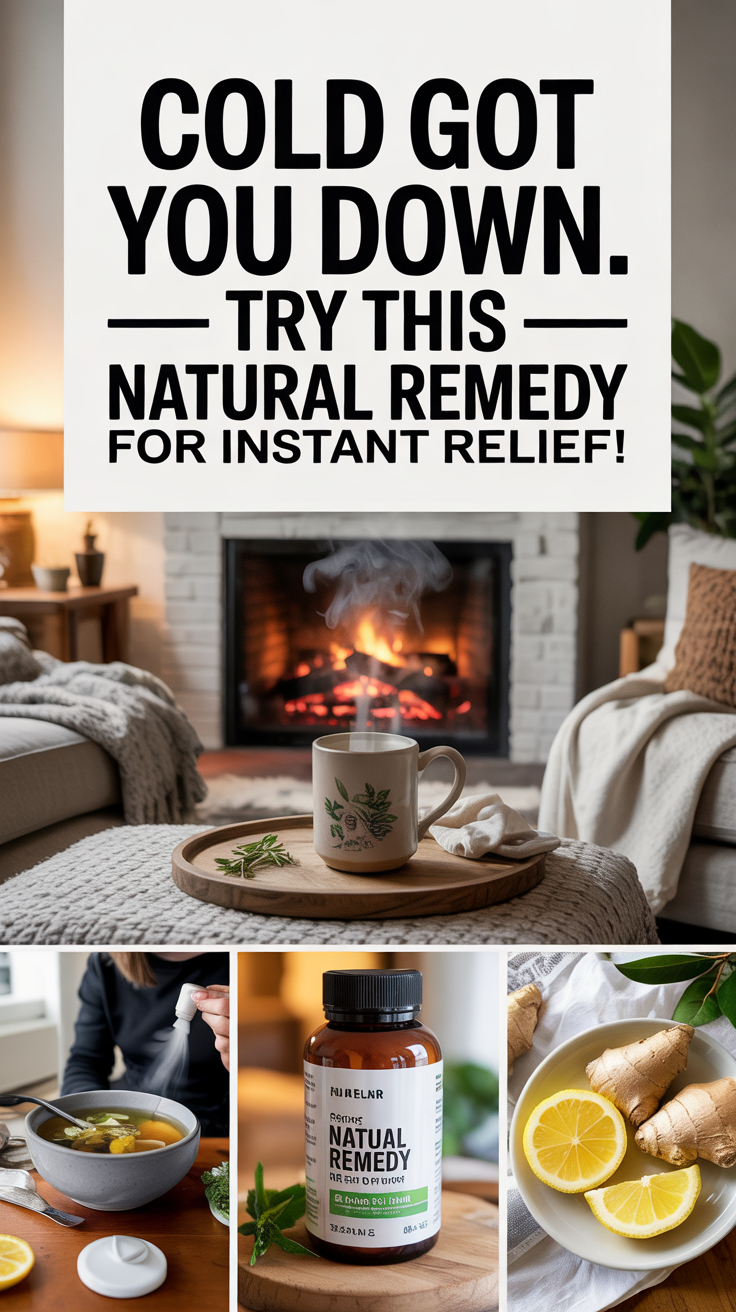Cold Got You Down. Try This Natural Remedy for Instant Relief!
When a cold hits, it can really knock you off your feet. You might be dealing with a sore throat, congestion, and that overall sluggish feeling. Fortunately, there are natural remedies that can provide instant relief. From soothing herbal teas to the invigorating effects of essential oils, you have options. Curious about how to combine these elements for maximum effectiveness? Let’s explore what you can do to feel better fast.
Understanding Cold Symptoms
When you catch a cold, you might notice a range of symptoms that can vary in intensity.
You’ll likely experience a runny or stuffy nose, sneezing, and a sore throat. Fatigue and mild headaches can creep in, making you feel out of sorts. Understanding these symptoms is key to finding comfort and relief. Additionally, zinc lozenges can block viral replication and help restore nasal barrier function, providing further support during your cold. This is particularly important because natural remedies can activate immune responses that help your body fight off the virus more effectively.
Many people turn to natural cold remedies to ease their discomfort. Honey and lemon in warm water can soothe your throat, while ginger tea might help reduce congestion. Incorporating anti-inflammatory properties from kitchen herbs like ginger and turmeric can further support your recovery.
Knowing what’s happening in your body helps you connect with others who share similar experiences, fostering a sense of belonging.
The Power of Herbal Remedies
Many people find comfort in herbal remedies as they seek relief from cold symptoms. These natural options not only help soothe your discomfort but also connect you with a community that values holistic health. Nighttime coughs can often be alleviated with these herbal solutions, allowing for a more restful sleep. Regular use of these remedies can significantly cut recovery time by up to 40%, enhancing their effectiveness in relieving cold symptoms.
Here are some powerful herbal remedies to consider:
- Echinacea: Boosts your immune system.
- Ginger: Eases sore throats and reduces inflammation.
- Peppermint: Relieves congestion and promotes easier breathing.
- Chamomile: Calms your mind and helps you sleep.
- Thyme: Acts as an antimicrobial and supports respiratory health.
Additionally, many of these remedies, such as honey and ginger, are well-supported by scientific research, enhancing their effectiveness in relieving cold symptoms. Embracing these remedies can create a sense of belonging as you nurture your well-being the natural way.
Essential Oils for Relief
While herbal remedies offer great benefits, essential oils can also provide effective relief from cold symptoms.
You might find eucalyptus oil helpful for clearing nasal passages, while peppermint can ease headaches and improve breathing. Simply add a few drops to a diffuser or mix with a carrier oil for topical application.
Lavender oil not only promotes relaxation but can also help you sleep better when you’re feeling under the weather. Incorporating these oils can aid in reducing inflammation in nasal passages, making you feel more connected and supported during your recovery.
Embrace the power of essential oils for soothing relief!
Nutrition to Strengthen Immunity
Here are some essential nutrients to include:
-
Vitamin C: Found in citrus fruits, bell peppers, and strawberries.
-
Zinc: Present in nuts, seeds, and whole grains.
-
Probiotics: Available in yogurt, kefir, and fermented foods, which support gut microbiome health. Additionally, incorporating apple cider vinegar into your routine can enhance digestive health and support a balanced gut microbiome, thanks to its probiotic properties.
-
Antioxidants: Found in berries, dark chocolate, and spinach.
-
Healthy fats: Sourced from avocados, olive oil, and fatty fish.
Home Remedies for Instant Comfort
When you’re feeling under the weather, home remedies can provide instant comfort and relief from cold symptoms. A steaming bowl of chicken soup warms you up while soothing your throat. Honey mixed with warm water or lemon can ease irritation and boost your spirits. Try inhaling steam from a bowl of hot water infused with eucalyptus oil for a refreshing breath. Steam therapy is an effective way to clear congested airways and promote relaxation, as it helps to moisten airways and alleviate coughing. A cozy blanket and a good book create a comforting atmosphere, making you feel snug and cared for. These simple remedies bring a sense of belonging, reminding you that self-care is essential, especially when you’re feeling your worst. Additionally, steam inhalation with eucalyptus oil is scientifically proven to clear airways and fight infection.
Staying Hydrated: The Key to Recovery
Here’s how you can keep your hydration game strong:
- Drink plenty of water throughout the day.
- Sip on warm herbal teas for soothing relief.
- Enjoy broths or soups for added nutrients.
- Snack on water-rich fruits like watermelon and oranges.
- Avoid caffeinated and alcoholic beverages, as they can dehydrate you.
Additionally, proper hydration supports the immune system’s ability to function effectively, enhancing your overall recovery process. Staying hydrated also helps reduce inflammation, as it aids the body in clearing out excess mucus and promotes natural decongestants that work with your body’s healing mechanisms.
The Role of Rest in Healing
Hydration plays a significant role in your recovery, but don’t underestimate the power of rest.
When you’re feeling under the weather, your body needs time to heal. Giving yourself permission to sleep and relax can make a world of difference.
It’s during these moments of rest that your immune system kicks into high gear, fighting off that cold. You might feel guilty for taking a break, but remember, everyone needs a little downtime.
Embrace the comfort of your blankets, sip on warm tea, and let your body do its work. You’re not alone in this; we all need rest to bounce back.
When to Seek Professional Help
Although your body often fights off colds on its own, there are times when seeking professional help becomes necessary.
Know when to reach out to a healthcare provider:
- If your symptoms last longer than 10 days
- If you experience a high fever (over 101°F)
- If you have difficulty breathing or chest pain
- If you notice severe headaches or sinus pain
- If you develop a rash or any unusual symptoms
Trust your instincts; your health matters.
Connecting with a professional can provide reassurance and ensure you receive the care you deserve. You’re not alone in this journey!








